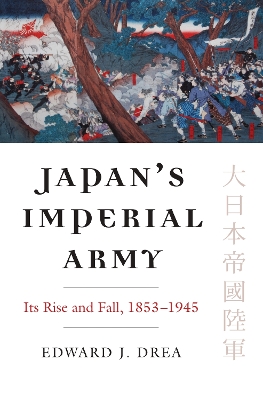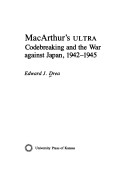Modern War Studies
2 total works
Popular impressions of the imperial Japanese army still promote images of suicidal banzai charges and fanatical leaders blindly devoted to their emperor. Edward Drea looks well past those stereotypes to unfold the more complex story of how that army came to power and extended its influence at home and abroad to become one of the world's dominant fighting forces. This first comprehensive English-language history of the Japanese army traces its origins, evolution, and impact as an engine of the country's regional and global ambitions and as a catalyst for the militarization of the Japanese homeland from mid-nineteenth-century incursions throught the end of World War II. Demonstrating his mastery of Japanese-language sources, Drea explains how the Japanese style of warfare, burnished by samurai legends, shaped the army, narrowed its options, influenced its decisions, and made it the institution that conquered most of Asia. He also tells how the army's intellectual foundations shifted as it reinvented itself to fulfill the changing imperatives of Japanese society - and how the army in turn decisively shaped the nation's political, social, cultural, and strategic course. Drea recounts how Japan devoted an inordinate amount of its treasury toward modernizing, professionalizing, and training its army - which grew larger, more powerful, and politically more influential with each passing decade. Along the way, it produced an efficient military schooling system, a well-organized active duty and reserve force, a professional officer corps that thought in terms of regional threat, and well-trained soldiers armed with appropriate weapons. Encompassing doctrine, strategy, weaponry, and civil-military relations, Drea's expert study also captures the dominant personalities who shaped the imperial army, from Yamagata Aritomo, an incisive geopolitical strategist, to Anami Korechika, who exhorted the troops to fight to the death during the final days of World War II. Summing up, Drea also suggests that an army that places itself above its nation's interests is doomed to failure.
Cracking the enemy's radio code is a task so urgent and so difficult that it demands the military's best minds and most sophisticated technology. But when the coded messages are in a language as complex as Japanese, decoding problems multiply dramatically. It took the US Army a full two years after the attack on Pearl Harbour to break the codes of the Japanese Imperial Army. But by 1944 the US was decoding more than 20,000 messages a month filled with information about enemy movements, strategy, fortifications, troop strengths, and supply convoys. In "MacArthur's ULTRA", historian Edward Drea recounts the story behind the Army's painstaking decryption operation and its dramatic breakthrough. He demonstrates how ULTRA (intelligence from decrypted Japanese radio communications) shaped MacArthur's operations in New Guinea and the Philippines and its effect on the outcome of World War II. From sources on both sides of the Pacific and national security agency declassified records, Drea has compiled a detailed listing of the ULTRA intelligence available to MacArthur.
By correlating the existing intelligence with MacArthur's operational decisions, Drea shows ow MacArthur used - and misused - intelligence information. He tells for the first time the story behind Macarthur's bold leap to Hollandia in 1944 and shows how ULTRA revealed the massive Japanese mobilization for what might have been (had it occurred) the bloodiest and most protracted engagement of the entire war - the Allied invasion of Japan. Drea also clarifies the role of ULTRA in Truman's decision to drop atomic bombs on Japan in 1945 and concludes that ULTRA shortened the war by six to ten months.
By correlating the existing intelligence with MacArthur's operational decisions, Drea shows ow MacArthur used - and misused - intelligence information. He tells for the first time the story behind Macarthur's bold leap to Hollandia in 1944 and shows how ULTRA revealed the massive Japanese mobilization for what might have been (had it occurred) the bloodiest and most protracted engagement of the entire war - the Allied invasion of Japan. Drea also clarifies the role of ULTRA in Truman's decision to drop atomic bombs on Japan in 1945 and concludes that ULTRA shortened the war by six to ten months.

